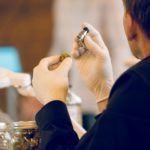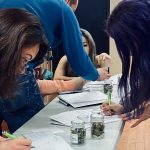
There is so much that has been said about using cannabis to treat a wide variety of symptoms and illnesses, however the use of cannabis as a preventative medicine has been largely overlooked by the academic and medical establishment. There is an overwhelming amount of scientific evidence that indicates, when populations have widespread ease of access to cannabis, as is the case now in Colorado or other similar US states, we observe a significant statistical decrease in opiate related deaths. By managing stress and replacing other more damaging drugs (like alcohol and opiates, stimulants, and other drugs), cannabis may help the informed user to avoid a plethora of issues linked to stress and drug use: depression, lack of sleep, anxiety, mental illness, cancer, hypertension, heart disease, obesity, diabetes, gastrointestinal issues, migraines and innumerable other issues. In addition to this, the antioxidants found in edible cannabis oils and tinctures may be an effective preventative for the development of cancer.
Some people do ingest cannabis purely for enjoyment. This is true. However, healthy enjoyment and release of tensions may have tangible physical benefits. The concept of the “recreational” myth is not to claim that people do not use cannabis for enjoyment. It is rather the concept that the word “recreational” in itself views cannabis through a narrow framework that does not really fit the reality of how it is typically used, and how it impacts those who use it. In fact, the rigid divide between “recreational” and “medical” systems of distribution may block many from understanding the beneficial role that cannabis can play when used from the standpoint of its therapeutic and harm reduction potential.
Smoking a joint to relax after work may be viewed as “recreational use” by current standards because the individual is a) purchasing the cannabis from a store with a recreational store license, which often means that the staff and range of products will not be geared towards serving the medical user and b) the person is not treating an observable malady or illness. What many of us do not think about is what this person would have done to deal with the stress of modern 9 to 5 life without the presence of cannabis as an option. Would this person have engaged in more drinking? Would they develop a reliance on other drugs? Would there be other negative outcomes associated with not mediating the stress of daily work? Many cannabis industry veterans on the west coast of Canada have started replacing the word “recreational” with “therapeutic” as the idea of cannabis as a preventative drug is not new, and many in the field have voiced an issue with this division for many years now.
Modern medicine channels most of its energies into resolving medical issues once they have already developed. The modern dialectic follows a similar pattern when discussing the topic of medical cannabis, as cannabis is effectively very useful for managing the symptoms of several medical conditions that have already expressed themselves in the body. However, using cannabis as preventative medicine and general tool for harm reduction may be of even greater use to society, particularly if we learn to incorporate cannabis into our cultural fabric in ways that are balanced and well informed. How can this happen in a framework where cannabis is treated as purely “recreational”?
The notion that cannabis use can be seen as a form of preventative medicine challenges the traditional dichotomy between “medical use” and “recreational use” that has so heavily influenced the legal and economic development of the cannabis industry thus far. What if cannabis, unlike most modern forms of tobacco and alcohol (which we have for some reason set as equivalents of cannabis in our legal and cultural dialectic) can be determined to be generally “good” for someone if used the right way?
We now know that the antioxidants in coffee and tea are good for us when we consume them in a balanced way. However coffee, unlike cannabis does not seem to have much to offer to those facing serious medical conditions. It may be the very fact that cannabis can be so useful and in some cases essential for those facing certain conditions combined with the many stereotypes and misunderstandings that we as a culture are dragging from prohibition era propaganda that have lead to such a rigidly polarized classification between the two perceived categories of cannabis use. The term “recreational” seems to put cannabis in the same category as a rollercoaster: used for fun and nothing else. Clearly, this classification should be challenged as it stands on antiquated and logically flawed concepts of medical utility, historically underpinned by tenuous moral arguments against the use of cannabis as the deplorable drug of choice of the “other”.
For this reason I have decided to start this series of posts that consider what the world would be like if we realized that there is nothing to gain from retailing cannabis as a “recreational” drug. Humanity must evolve in terms of our understanding of the social, cultural and medical use of natural medicines and intoxicants. Cannabis is a fantastic doorway for us to rediscover a broader, more holistic and transcendental idea of what the word “healing” can mean for us as individuals and as a culture.
The benefits of having staff and product makers who are dedicated to using cannabis as a medical or therapeutic aid will be a benefit to any cannabis user. The quality and understanding of the product will always be superior in a medical setting- why would the consumer or the worker settle for mediocre products/services? Dispensary owners and workers are missing a crucial opportunity to develop valuable career skills and provide therapeutic cannabis products, services and advice to those that have not yet developed a full blown condition that would qualify them as a “medical cannabis user”. Instead cannabis is being utilized under the same flawed framework that we use pharmaceutical drugs- wait until the problem happens and then deal with it. Natural medicine does not need to be this way.
In hopes of starting a conversation about this topic I will be following up in the coming weeks and months with posts covering the following topics, with footnotes of all relevant publications and reference material.
Here is a list of upcoming posts on this topic:
…
Also keep an eye out for
The myth of modern “superweed” …coming soon!
MORE FROM THE BLOG





WAIVER & RELEASE (the “Release”)
This event is conducted by CannaReps Consulting Ltd. (“CannaReps or Company”). Please read and submit below.
I am an attendee at an event hosted by CannaReps (the “Workshop“). I release CannaReps from any and all liability, claims, demands, actions and causes of action whatsoever arising out of or related to any loss, damage or injury, including death, that may be sustained by me while participating in the Workshop.
I understand and agree that:
CONFIDENTIALITY
Any confidential or proprietary information or material relating to the Company’s operations or business which I obtain from the Company or its officers, employees, agents, suppliers or customers or otherwise by virtue of my participation with the Company or by the Company’s predecessor. Confidential or proprietary information or material includes, without limitation, the following types of information or material, both existing and contemplated, regarding the Company or its parent, affiliated or subsidiary companies: corporate information, including contractual licensing arrangements, plans, strategies, tactic, policies, resolutions, patents, trademarks, printed or digitized materials, handouts and brochures. Including any marketing information including sales, investment and product plans, customer lists, strategies, methods, customers, prospects and market research data. Including trade secrets; technical information, including drawings, designs, personal information (the “Confidential Information”).
I understand that the copyright and proprietary interest of any material provided to me belongs to CannaReps. All shared experiences from the Workshop are to remain confidential and private. I agree not to disclose any of the information learned during the Workshop outside of the Workshop except with others who attend the Workshop. I will not use any audio or video recording equipment during the Workshop, unless CannaReps approves of the recording and filming by providing prior written consent. I understand that any audio or video recording made during the Workshop is the property of CannaReps. I will not use CannaReps’ information for business or commercial purposes, without first obtaining the prior written consent of CannaReps.
INTELLECTUAL PROPERTY
I understand, acknowledge and agree that all copyright, trademarks, trade secrets, intellectual property rights, and any other rights arising from any designs, and all of the work products and materials conceived, developed or created by the CannaReps and any rights ancillary thereto (collectively, “Intellectual Property Rights”) which were solely or jointly with others, conceives, designs, creates, derives, develops or makes in the course of or in connection with the work with CannaReps shall belong solely to CannaReps. If you haven’t already, you shall promptly disclose to CannaReps in writing any and all Intellectual Property Rights, conceived, created, derived, developed or made in the course of or otherwise in connection with my participation with CannaReps, whether alone or with others, and whether during work shop hours or through the use of facilities and properties of CannaReps.
INDEMNITY
I agrees to indemnify and hold harmless CannaReps, its officers and directors, employees and its affiliates and their respective successors and assigns and each other person, if any, who controls any thereof, against any loss, liability, claim, damage and expense whatsoever (including, but not limited to, any and all expenses whatsoever reasonably incurred in investigating, preparing or defending against any litigation commenced or threatened or any claim whatsoever) arising out of or based upon any false representation or warranty or breach or failure by me to comply with any covenant or agreement made by me herein or in any other document furnished by me to any of the foregoing in connection with this transaction.
CONSENT
Notwithstanding the immediately preceding paragraph, I consent to and grant CannaReps, the Workshop, and its assignees, the right to photograph and record me, my name, voice, appearance and likeness and other material furnished by me for use on trusted online media which include, but are not limited to, their website and social media pages. My hereby release said matter in perpetuity to CannaReps without prejudice and acknowledge that this consent is freely given without expecting compensation.
By submitting my email address below, I agree to receive electronic communication from CannaReps including personal course information, news, updates and promotions regarding CannaReps’ products. I understand that I can withdraw my consent at any time.
PRIVACY POLICY
Protecting your privacy is important to CannaReps. This Privacy Policy (“Privacy Policy”) set outs the ways in which we use your information and how we ensure its protection.
CannaReps will only collect personal information (“Information”) that will allow us to provide, enhance, market or improve our events and services. Information is collected by means of registration for any CannaReps sponsored event or service. Information collected may include name, age, gender, address, email address, payment information, and geographical information.
CannaReps may share Information. CannaReps retains the right to share Information and other statistics with our partners, prospective advertisers, and other third parties for the purposes of improving, protecting, enhancing, and promoting our events and services. CannaReps may also disclose information to our affiliates, agents, contractors, and service providers in order to facilitate the functioning and maintenance of our events and services. We will not sell any information to advertisers or other third parties.
This Privacy Policy only covers the treatment of Information and other non-identifiable information gathered by CannaReps. This Privacy Policy does not apply to the practices of any third-party services. CannaReps does not take responsibility for the content or privacy policies of any third parties. CannaReps recommends that you review the privacy policies of any third-party service providers or events you access, use, or register for through our events or services.
This Privacy Policy has been established to help you understand our commitment to protecting your privacy. CannaReps reserves the right, at any time, to change or replace any portion of our Privacy Policy. You will be notified of any changes, if we believe, they materially impact your experience at our events or services. Continued use of our services after any change to the Private Policy constitutes an acceptance of those changes.
By submitting this Release and providing Information during the registration process, including the Exhibitor’s Agreement, you consent to the collection and use of your Information for these purposes.
If you have any questions or concerns please email us at info@cannareps.ca.